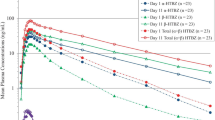Summary
Marked interindividual variation has been observed in the pharmacokinetics of the antiarrhythmic agent mexiletine. The fact that its urinary excretion is dependent on urinary pH may account, in part, for such variation. The influence that genetic differences in hepatic metabolism of the debrisoquine-type may have on mexiletine pharmacokinetics was considered in this study. The pharmacokinetics and urinary excretion of mexiletine (250 mg administered intravenously) were investigated in 5 rapid extensive metabolisers (EM), 5 slow EM and 5 poor metabolisers (PM) of debrisoquine, under conditions of controlled urinary pH.
Mexiletine disposition kinetics was found to be altered in PM individuals. These subjects showed higher total area under the curve (AUC), (15.7 versus 8.16 μg · h · ml−1) prolonged elimination half-lives (in serum and urine) (serum: 18.5 versus 11.6 h, urine: 19.2 versus 11.7 h) and lower total clearance values compared with EM (216 versus 450 ml · min−1). In this respect, slow EM individuals generally presented intermediate values of those pharmacokinetic parameters. A higher incidence of adverse-effects was also observed among slow EM and PM subjects.
It is concluded that genetic differences in mexiletine oxidation of the debrisoquine-type have an influence on its observed pharmacokinetic variability. The clinical consequences are discussed.
Similar content being viewed by others
References
Kiddie MA, Royds RB, Shaw TRD (1973) Preliminary studies on the pharmacology of an antidysrhythmic, kö1173, in man. Br J Clin Pharmacol 47: 674P
Talbot RG, Clark RA, Nimmo J, Neilson JMM, Julian DG, Prescott LF (1973) Treatment of ventricular arrhythmias with mexiletine (kö1173). Lancet II: 399–404
Kaye CM, Kiddie MA, Turner P (1977) Variable pharmacokinetics of mexiletine. Postgrad Med J 53 [Suppl 1]: 56–58
Otton SV, Inaba T, Kalow W (1984) Competitive inhibition of sparteine oxidation in human liver by beta-adrenoceptor antagonists and other cardiovascular drugs. Life Sciences 34: 73–80
Brøsen K, Klysner R, Gram LF, Otton SV, Bech P, Bertilsson L (1986) Steady-state concentrations of imipramine and its metabolites in relation to the sparteine/debrisoquine polymorphism. Eur J Clin Pharmacol 30: 679–684
Lledó-Polo MP (1991) PhD Dissertation, University of London
Barbeau A, Roy M, Paris S, Cloutier T, Plasse L, Poirier J (1985) Ecogenetics of Parkinson's disease: 4-hydroxylation of debrisoquine. Lancet: 1213–1215
Kiddie MA, Kaye CM, Turner P, Shaw TRD (1974) The influence of urinary pH on the elimination of mexiletine. Br J Clin Pharmacol 1: 229–232
Johnston A, Burgess CD, Warrington SJ, Hamer NAJ (1979) The effect of spontaneous changes in urinary pH on mexiletine plasma concentrations and excretion during chronic administration to healthy volunteers. Br J Clin Pharmacol 8: 349–352
Johnston A, Woollard RC (1983) STRIPE: and interactive computer program for the analysis of drug pharmacokinetics. J Pharmacol Methods 9: 193
Podrid PJ (1986) New antiarrhythmic drugs: contrast and comparison. In: Baskf K, Corporation F (eds) The new pharmacotherapy of arrhythmia management: focus on propafenone (Monograph) pp 17–20
Campbell NPS, Pantridge JF, Adgey AAJ (1978) Long term oral antiarrhythmic therapy with mexiletine. Br Heart J 40: 796–801
Beckett AH, Chidomere EC (1977) The distribution, metabolism and excretion of mexiletine in man. Postgrad Med J 53 [Suppl 1]: 60–66
Lledó P, Abrams SML, Johnston A, Pearson RM (1990) Mexiletine pharmacokinetics and debrisoquine hydroxylator status. Eur J Pharmacol 183: 2387
Lledó P, Abrams SML, Johnston A, Pearson RM (1991) Mexiletine elimination and debrisoquine hydroxylator status. Br J Clin Pharmacol 30: 598P
Broly F, Vandamme N, Libersa C, Lhermitte M (1991) The metabolism of mexiletine in relation to the debrisoquine/sparteine-type polymorphism of drug oxidation. Br J Clin Pharmacol 32: 459–466
Lennard MS, Tucker GT, Silas JH, Freestone S, Ramsay LE, Woods HF (1983) Differential stereoselective metabolism of metoprolol in extensive and poor debrisoquine metabolisers. Clin Pharmacol Ther 34: 732–737
Siddoway LA, Thompson KA, McAllister CB, Wang T, Wilkinson GR, Roden DM, Woosley RL (1987) Polymorphism of propafenone metabolism and disposition in man: clinical and pharmacokinetic consequences. Circulation 75: 785–791
Meyer UA, Gut J, Kronbach T, Skoda C, Meier UT, Catin T (1986) The molecular mechanisms of two common polymorphisms of drug oxidation — evidence for functional changes in cytochrome P-450 isozymes catalysing bufuralol and mephenytoin oxidation. Xenobiotica 16: 449–464
Gould AC, Amoah AGB, Park DV (1986) Stereoselective pharmacokinetics of perhexiline. Xenobiotica 16: 491–502
Meese CO, Eichelbaum M (1988) Stereoselective drug metabolism and pharmacodynamic consequences. In: Kato R, Estabrook RW, Cayen MN (eds) Xenobiotic metabolism and disposition. Taylor & Francis, London, pp 179–184
Nitsch J, Steinbeck G, Luderitz B (1983) Increase of mexiletine plasma levels due to delayed hepatic metabolism in patients with chronic liver disease. Eur Heart J 4: 810–814
Author information
Authors and Affiliations
Rights and permissions
About this article
Cite this article
Lledó, P., Abrams, S.M.L., Johnston, A. et al. Influence of debrisoquine hydroxylation phenotype on the pharmacokinetics of mexiletine. Eur J Clin Pharmacol 44, 63–67 (1993). https://doi.org/10.1007/BF00315282
Received:
Accepted:
Issue Date:
DOI: https://doi.org/10.1007/BF00315282




